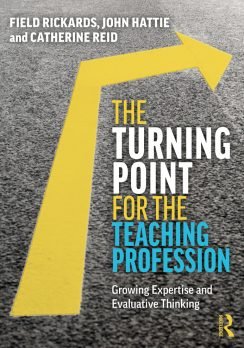The recommendations in this book could prove useful for small-scale improvement but the lack of a policy ‘big picture’ means its potential is likely to go unfulfilled, writes Terry Freedman
When the term “teaching profession” arises, my reaction is more often than not to borrow from Gandhi and opine that such a thing would be a good idea.
This is not to disparage teachers. Given that the government has laid down what must be taught, periodically pontificates on the ‘best’ teaching methods, goes so far as to indicate a preference for particular resources and has appointed an external organisation to oversee quality control, can teaching be truly thought of as a profession?
This is the question this book specifically sets out to tackle, and on most of its suggested criteria the answer is a resounding no.
The hope expressed by Field Rickards, John Hattie and Catherine Reid is that teachers might be held in higher esteem in the eyes of society at large. But who will argue the case for the suggestions they put forward, and who will listen?
The book makes the very valid point that these days schools – and that usually means teachers – are expected to do much more than address literacy, numeracy and core subject knowledge. More and more is added to the curriculum, but rarely is anything taken out.
One of the authors’ suggestions is that schools and other agencies should work together in order to address the needs of the whole child. This makes sense on paper, and indeed they provide several case studies of this approach working in practice.
The practical obstacles to implementation are not adequately addressed
But the practical obstacles to implementation are not adequately addressed. For example, the authors cite a local authority attempt to get social services, education and health practitioners talking to each other under the auspices of the Every Child Matters initiative. The attempt is abortive because it ends up bogged down in communications issues like the word ‘exclusion’ having different meanings for different participants.
The authors’ suggestions are insightful and could easily inform policy on a smaller scale. But the question of whether any such collaboration can ever work as an add-on to existing practices is not dealt with. Having suspended my disbelief that the suggestions in this book might be taken up by politicians – it is co-authored by John Hattie, after all – the absence of that big-picture insight re-awakened my cynicism.
Nevertheless, as one would expect from a book co-written by Hattie, it contains a great many research findings and suggestions based on them that a forward-looking school or academy chain could take on.
Its two key principles are the idea of the teacher as expert, and what it calls ‘clinical practice’. Thus expert teachers – clearly distinguished from novices throughout – should be involved in mentoring and quality assurance, and respected as the real drivers of change. The research findings also give the lie to the idea that ‘facilitators’ could do the job just as well.
For instance, research is cited to the effect that experts and novices see problems, and go about solving them, in different ways. Hence, The Turning Point emphasises the potential benefits of collaborative and collegiate practice among teachers, and the use of expert teachers to mentor less experienced ones. The authors point out that the process of becoming an expert takes time, deliberate practice, continual learning and an openness to alternatives.
With regards to clinical practice, the authors define it as placing the student at the centre, and addressing six key questions I won’t list here. They take as its starting point the proposition that schools should provide a minimum of one year’s learning for each year of ‘input’.
It is easy to point out the difficulties of implementing a collaborative approach, and in fairness, the authors do just that. Timetabling constraints, teacher shortages and accountability mechanisms that leave teachers fearing that seeking advice will be seen as admitting to failure are just a few. And without it, clinical practice seems a distant ideal.
But there is a plethora of research evidence here that provides great food for thought and could prove useful for a school or trust wishing to change things from the ground up, rather than tinkering around the edges.
If only policy makers will let them.
This book was first reviewed in SchoolsWeek.

